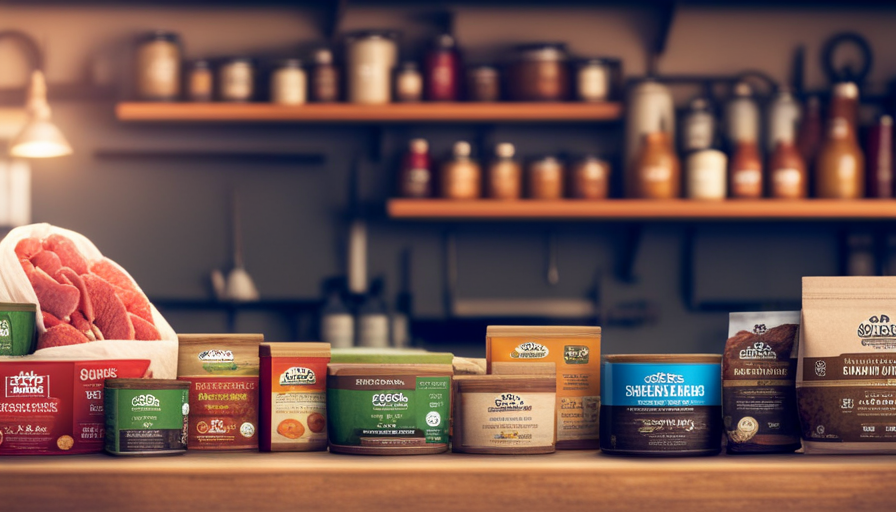In a society where unhealthy food is celebrated as a culinary savior, and unpasteurized milk is considered essential, the distinction between convenience and well-being is becoming more and more unclear. Metaphorically, these conflicting food preferences symbolize the contradictory essence of today’s food culture.
On one hand, we are enticed by the tantalizing allure of processed foods, their vibrant packaging promising quick satisfaction and pleasure. On the other hand, we find ourselves questioning the safety and nutritional value of raw milk, a product once revered for its purity.
As we navigate this complex terrain, it is crucial to understand the rise of processed foods, debunk myths surrounding raw milk, and acknowledge the health risks associated with excessive junk food consumption. By making informed decisions about what we eat and promoting food education and awareness, we can strive to strike a balance between convenience and health in our food choices.
It is time to unravel the mysteries of our modern food world and reclaim control over our well-being.
Key Takeaways
- Processed foods, despite their appeal, are high in sugar, unhealthy fats, and additives, leading to weight gain and increased risk of chronic diseases.
- Opting for whole, unprocessed foods can help regain control over health and vitality.
- Alternative diets like vegetarianism, veganism, and paleo can increase nutrient intake, improve digestion, and lower the risk of chronic diseases.
- Raw milk myths claiming it is healthier and boosts the immune system are debunked by scientific research, as raw milk carries a higher risk of bacterial contamination and lacks the safety measures of pasteurized milk.
The Rise of Processed Foods
The rise of processed foods has left you trapped in a cycle of addiction and empty calories, robbing you of your health and vitality. These alternative foods, often marketed as convenient and tasty, have infiltrated our diets with disastrous consequences.
The impact of advertising cannot be underestimated, as it lures us in with promises of deliciousness and satisfaction. Processed foods are high in sugar, unhealthy fats, and additives, making them addictive and detrimental to our health. They lack the essential nutrients our bodies need to thrive, leading to weight gain, increased risk of chronic diseases, and decreased overall well-being. The convenience they offer comes at a high price.
Advertising plays a significant role in promoting these harmful products. Companies spend billions of dollars to create persuasive campaigns that appeal to our desires and cravings. They strategically target vulnerable populations, such as children, who are more susceptible to their influence. As a result, we find ourselves constantly surrounded by tempting advertisements that make it difficult to resist the allure of processed foods.
To break free from this cycle, it is essential to be aware of the impact of advertising and make informed choices about the foods we consume. By opting for whole, unprocessed foods, we can regain control over our health and vitality. It’s time to prioritize nourishing our bodies with real, nutrient-dense foods and reclaim our well-being.
Understanding Alternative Diets
Contrary to popular belief, alternative diets can provide numerous health benefits, such as the case of John, who successfully improved his overall well-being by following a plant-based diet.
Alternative diets refer to any eating pattern that deviates from the mainstream, such as vegetarianism, veganism, or paleo. These diets often come with specific dietary restrictions, but they can be a great way to explore new food options and improve your health.
Here are three benefits of alternative diets:
-
Increased nutrient intake: Alternative diets often prioritize whole, nutrient-dense foods like fruits, vegetables, whole grains, and legumes. These foods are packed with essential vitamins, minerals, and antioxidants that support overall health and well-being.
-
Improved digestion: Many alternative diets eliminate processed foods and focus on natural, whole ingredients. This can lead to improved digestion and a reduction in digestive issues like bloating, gas, and indigestion.
-
Lower risk of chronic diseases: Studies have shown that alternative diets, especially plant-based diets, can reduce the risk of chronic diseases like heart disease, diabetes, and certain types of cancer. These diets tend to be lower in saturated fats and cholesterol while being higher in fiber, which can have a positive impact on overall health.
By considering alternative diets and their associated dietary restrictions, individuals like John have found a way to improve their health and well-being. It’s essential to consult with a healthcare professional or registered dietitian before making significant changes to your diet to ensure you’re meeting your nutritional needs.
The Paradox of Junk Food
Despite the allure of indulgent treats, it’s important to consider the paradoxical effects they can have on your overall well-being.
In a world where junk food is good for you, it’s easy to be swayed by clever marketing campaigns that promote these unhealthy choices as tasty and desirable. However, the truth is that consuming too much junk food can have serious consequences for your physical and mental health.
Junk food marketing plays a significant role in shaping our food choices. Advertisements for sugary drinks, salty snacks, and greasy fast food are designed to trigger cravings and create a sense of urgency to indulge. The constant exposure to these messages can make it difficult to resist the temptation, leading to a cycle of unhealthy eating habits.
Beyond the physical impact, the psychological effects of junk food are also worth considering. Research has shown that consuming high levels of processed foods can increase the risk of developing mental health disorders such as depression and anxiety. These foods can disrupt the balance of gut bacteria, which play a crucial role in the production of neurotransmitters that regulate mood.
While indulging in junk food occasionally may not have significant consequences, it’s important to be mindful of the potential risks associated with excessive consumption. By understanding the paradox of junk food and its effects on your overall well-being, you can make more informed choices and prioritize your health.
Debunking Myths About Raw Milk
Open your mind and explore the myths surrounding unprocessed dairy products. Raw milk has long been a controversial topic, with advocates claiming numerous health benefits and opponents raising concerns about safety. Let’s debunk some of the common myths surrounding raw milk.
Myth 1: Raw milk is healthier than pasteurized milk. While raw milk enthusiasts argue that pasteurization destroys beneficial enzymes and nutrients, scientific research tells a different story. Pasteurization is a crucial process that eliminates harmful bacteria, such as E. coli, Salmonella, and Listeria, which can cause severe illnesses.
Myth 2: Raw milk comes from healthy cows, so it’s safe. Unfortunately, this notion is flawed. Even healthy-looking cows can carry dangerous pathogens in their udders, leading to milk contamination. Moreover, raw milk lacks the safety measures and regulations that ensure the quality and cleanliness of pasteurized milk.
Myth 3: Raw milk can boost your immune system. While raw milk enthusiasts claim that consuming it can enhance immunity, there is no solid scientific evidence supporting this claim. In fact, consuming raw milk poses unnecessary risks, especially for vulnerable populations like pregnant women, young children, and individuals with weakened immune systems.
To ensure public health and safety, raw milk regulations exist in many countries. Pasteurization remains the gold standard for milk safety, reducing the risk of foodborne illnesses. So, while the debate around raw milk continues, it’s essential to prioritize evidence-based information and make informed decisions regarding dairy consumption.
Health Risks Associated with Junk Food
Let’s explore the potential risks that come with indulging in unhealthy snacks and treats! While junk food may be tempting and satisfying to your taste buds, it’s important to understand the risks and consequences it can have on your health.
One of the major risks associated with consuming junk food is weight gain. Most junk foods are high in calories, unhealthy fats, and added sugars, which can lead to an increase in body weight and body fat percentage. This can not only affect your physical appearance but also increase your risk of developing chronic diseases such as heart disease, type 2 diabetes, and certain types of cancer.
Another consequence of indulging in junk food is poor nutrition. These foods are often low in essential nutrients such as vitamins, minerals, and fiber, while being high in unhealthy ingredients like sodium and artificial additives. Regular consumption of junk food can lead to nutrient deficiencies and negatively impact your overall health and well-being.
Furthermore, junk food has been linked to an increased risk of developing digestive issues. These foods are typically low in fiber, which is important for maintaining a healthy digestive system. This can result in constipation, bloating, and other gastrointestinal discomforts.
While indulging in unhealthy snacks and treats may be tempting, it’s important to be aware of the risks and consequences they can have on your health. By making informed choices and incorporating a balanced diet, you can enjoy a healthier lifestyle and reduce the potential negative impacts of junk food.
Nutritional Benefits of Raw Milk
Raw milk can provide a range of essential nutrients that can contribute to a healthier lifestyle. Despite the controversy surrounding its consumption, raw milk has several nutritional benefits.
It is a good source of vitamins, minerals, and healthy fats. Raw milk contains high levels of vitamin D, which is essential for bone health and immune function. It also contains calcium, which is important for strong bones and teeth. Additionally, raw milk is rich in omega-3 fatty acids, which have been linked to improved heart health.
However, it is important to be aware of the risks associated with raw milk consumption. Raw milk carries a higher risk of bacterial contamination compared to pasteurized milk. This can lead to foodborne illnesses such as salmonella and E. coli infections. These infections can cause severe symptoms, especially in vulnerable individuals such as children, pregnant women, and those with weakened immune systems.
To minimize the risks, it is crucial to ensure that raw milk comes from a reputable source and is handled and stored properly. It is also advisable to consult with a healthcare professional before incorporating raw milk into your diet, especially if you have any underlying health conditions.
While raw milk does offer nutritional benefits, it is essential to weigh the potential risks associated with its consumption. Make informed decisions based on your own health needs and consult with a healthcare professional for personalized advice.
Balancing Convenience and Health in Food Choices
Finding the right balance between convenience and nourishment in your food choices can be like navigating a colorful marketplace filled with tempting aromas and vibrant displays. It’s easy to be enticed by the convenience of junk food, which is often readily available and requires little to no preparation. However, it’s important to consider the nutritional value of the food you consume.
When it comes to convenience vs. nutrition, finding balance in your food choices is essential for maintaining a healthy lifestyle. While convenience foods may save you time and effort, they often lack essential nutrients and can contribute to weight gain and other health issues. On the other hand, focusing solely on nutrition can lead to restrictive eating patterns and can be difficult to sustain in the long term.
To strike a balance, consider the following:
-
Plan ahead: Take some time each week to plan your meals and snacks. This will help you make healthier choices and ensure that you have convenient options readily available.
-
Choose whole foods: Opt for whole, unprocessed foods whenever possible. These foods are not only more nutritious but also tend to be less processed and contain fewer additives and preservatives.
-
Incorporate convenience foods mindfully: While it’s important to prioritize whole foods, there’s nothing wrong with incorporating some convenience foods into your diet. Just be mindful of their nutritional value and choose options that align with your health goals.
By finding the right balance between convenience and nutrition, you can enjoy the benefits of both without compromising your health.
Making Informed Decisions About What to Eat
Take a moment to consider the benefits of making informed decisions about what to eat, as it allows you to take control of your health and nourish your body with mindful choices. In a world where junk food is good for you and raw milk needs debunking myths, it becomes even more important to be aware of alternative diets and the evidence behind them.
With the rise of fad diets and conflicting information, it can be challenging to navigate through the sea of nutrition advice. However, by staying informed and seeking evidence-based information, you can make choices that align with your personal health goals. It’s crucial to critically evaluate claims and look for reputable sources that support or debunk these claims.
Alternative diets, such as veganism, vegetarianism, or gluten-free diets, have gained popularity in recent years. While they may not be suitable for everyone, understanding the reasons behind these dietary choices can help you make informed decisions. By exploring the scientific research and listening to your body’s needs, you can find a balance that works for you.
Debunking myths is another essential aspect of making informed decisions. It’s easy to fall into the trap of believing false information, especially when it comes to food and health. However, by seeking out reliable sources and consulting with healthcare professionals, you can separate fact from fiction and make choices that are truly beneficial for your well-being.
Making informed decisions about what to eat empowers you to take control of your health. By exploring alternative diets and debunking myths, you can make choices that align with your goals and nourish your body with mindful choices. Remember to stay informed, seek evidence-based information, and consult with professionals to make the best decisions for your well-being.
Promoting Food Education and Awareness
Transition: Now that you understand the importance of making informed decisions about what you eat, let’s delve into the next crucial aspect of promoting a healthy food culture: food education and awareness.
Current Subtopic: Promoting Food Education and Awareness
To truly make a positive impact on our food system, it is essential to prioritize food literacy and educate ourselves about the sources and implications of our food choices. Food literacy refers to the knowledge and skills necessary to make informed decisions about food, including understanding where our food comes from, how it is produced, and its impact on our health and the environment.
One effective way to promote food education is through sustainable agriculture. Sustainable agriculture aims to produce food in a way that minimizes environmental harm, promotes biodiversity, and supports local communities. By supporting sustainable farming practices, such as organic farming, permaculture, and regenerative agriculture, we can contribute to a healthier food system and a more sustainable future.
To help you visualize the importance of food education and sustainable agriculture, take a look at the table below:
| Food Education | Sustainable Agriculture | |
|---|---|---|
| Definition | Knowledge about food sources, production, and impact | Environmentally-friendly farming practices |
| Key Benefits | Informed food choices, better health outcomes | Reduced environmental impact, support for local communities |
| Examples | Nutrition education programs, cooking classes | Organic farming, permaculture, regenerative agriculture |
By promoting food education and awareness, we can empower individuals to make healthier food choices and contribute to a more sustainable and resilient food system.
Navigating the Modern Food Landscape
Explore the maze of the modern food landscape and discover how to make healthier choices that align with your values and nourish your body.
In a world filled with processed junk food that’s supposedly good for you and raw milk that needs careful handling, it can be overwhelming to navigate the grocery store aisles. However, armed with knowledge about food labeling and sustainable farming practices, you can confidently choose foods that promote your well-being.
Here are 5 key tips to help you navigate the modern food landscape:
-
Read food labels: Pay attention to the ingredients list and look for whole, unprocessed foods. Avoid products that contain artificial additives, excessive sugar, or unhealthy fats.
-
Know your sources: Support sustainable farming practices by choosing organic, locally sourced produce and meats. This not only benefits your health but also supports the environment and local economy.
-
Opt for whole foods: Incorporate more fresh fruits, vegetables, whole grains, and lean proteins into your diet. These nutrient-dense foods provide essential vitamins, minerals, and fiber.
-
Limit processed foods: Minimize your intake of heavily processed foods that are often high in unhealthy additives, sodium, and trans fats. Instead, focus on homemade meals prepared from scratch.
-
Stay informed: Keep up with the latest research and recommendations on nutrition and sustainable farming. By staying informed, you can make educated choices that positively impact your health and the environment.
By following these tips, you can navigate the modern food landscape with confidence, making choices that nourish your body and align with your values.
Frequently Asked Questions
What are the potential health risks associated with consuming processed foods?
Potential health risks associated with consuming processed foods include an increased risk of obesity, heart disease, type 2 diabetes, and certain types of cancer. Processed foods are often high in added sugars, unhealthy fats, sodium, and artificial additives, which can negatively impact your health.
Regular consumption of processed foods has been linked to weight gain and chronic inflammation, which can further contribute to various health problems.
It’s important to prioritize whole, unprocessed foods for a balanced and nutritious diet.
Are there any nutritional benefits to consuming raw milk?
There is ongoing debate about the nutritional benefits of consuming raw milk. Some studies suggest that raw milk contains more nutrients, enzymes, and beneficial bacteria compared to pasteurized milk. It’s claimed that these properties can improve digestion and boost the immune system.
However, it’s important to note that raw milk also carries safety concerns. It can be a source of harmful bacteria, such as E. coli and Salmonella, which can cause serious illness. Therefore, it’s crucial to weigh the potential nutritional benefits against the safety risks before consuming raw milk.
How can individuals make informed decisions about what to eat in today’s modern food landscape?
To make informed decisions about what to eat in today’s modern food landscape, you can start by looking at food labeling. Pay attention to the nutrition facts, ingredients, and any claims made on the packaging.
Additionally, consider supporting sustainable farming practices by choosing organic or locally sourced foods.
It’s important to gather information from reliable sources and strike a balance between your personal preferences and making healthy choices based on evidence.
What are some common myths about raw milk and are they true or false?
Common misconceptions about raw milk exist, and it’s important to separate fact from fiction.
One common myth is that raw milk is healthier than pasteurized milk. However, scientific evidence shows that pasteurization is essential for killing harmful bacteria and reducing the risk of foodborne illnesses.
Another misconception is that raw milk has superior nutritional benefits. Yet, research indicates that pasteurized milk provides the same essential nutrients.
Therefore, it’s crucial to rely on evidence-based information when considering the health benefits of raw milk.
How can food education and awareness be promoted in order to improve people’s understanding of the food they consume?
To promote food education and consumer awareness, it’s crucial to provide accessible and evidence-based information. This can be done through various channels such as schools, community programs, and online resources.
By teaching individuals about the nutritional value of different foods, the importance of reading labels, and the impact of food choices on their health, we can empower them to make informed decisions.
Additionally, raising awareness about food production processes and encouraging critical thinking will further enhance understanding of the food we consume.
Can Raw Organic Food Be Purchased at the Same Place as Organic Clothing?
Yes, you can buy raw organic boy shorts organic along with organic food at the same place. Some stores offer a range of organic products, including clothing and food items. It’s convenient for those looking to support a sustainable and healthy lifestyle.
Conclusion
In conclusion, navigating the modern food landscape can be a challenging task. With the rise of processed foods and the popularity of alternative diets, it can be tempting to fall into the paradox of junk food being good for you and raw milk being necessary.
However, it’s crucial to debunk these myths and understand the health risks associated with consuming excessive junk food. By balancing convenience and health in our food choices, making informed decisions, and promoting food education and awareness, we can strive for a healthier and more sustainable future.
Remember, as the saying goes, "You are what you eat," so choose wisely and nourish your body with wholesome options.










